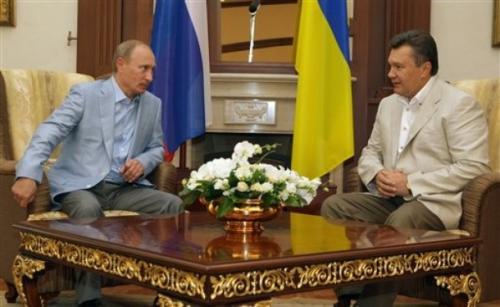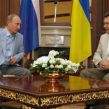
Ukraine Braces for Gas Transportation Consortium with Russia
Publication: Eurasia Daily Monitor Volume: 9 Issue: 7
By:

Kyiv’s hopes for cheaper Russian gas from January 1, have failed to materialize. However, gas talks are continuing and there are signs that Moscow will agree to cut the price of gas in exchange for a share in a consortium to be set up to operate Ukraine’s pipelines carrying Russian gas to the EU. The main dispute is about the size of this share, as Russia wants to obtain control of Ukraine’s gas transportation system, while Kyiv hopes to dilute Gazprom’s participation in the pipelines with the EU’s help.
Ukrainian President, Viktor Yanukovych, and Prime Minister, Mykola Azarov, pinned high hopes on their meetings with the Russian leadership in Moscow on December 20, and the Ukrainian dailies Kommersant-Ukraine and Segodnya even reported on December 21 that Azarov would announce a new gas price later that day. Ukraine hoped to lower the price from the $400 per 1,000 cubic meters of gas, which it paid Gazprom in the fourth quarter of 2011, to between $210 and $230. In this case, the budget of the state-subsidized oil and gas company, Naftohaz Ukrainy, for next year might have been balanced and the International Monetary Fund (IMF) may have unfrozen its $15 billion assistance package to Ukraine. The government’s failure to improve the situation at Naftohaz was one of the main reasons behind the IMF’s refusal to issue loans to Ukraine last year.
However, Azarov told his ministers after returning from Moscow on December 21, that the talks with Russia had been deadlocked. He said the government could not accept Russian conditions (www.zn.ua, December 21). As a result, the government submitted to parliament a state budget bill for 2012, based on the gas price formula, which has been in force since 2009, and parliament promptly passed it. The formula suits Russia but it does not meet the aims of the Ukrainian government, which has been trying to persuade Russia to either change it or give a new discount in addition to the reduction of $100 per 1,000 cubic meters that Ukraine received in 2010 in exchange for extending the Russian Black Sea Fleet lease of the Sevastopol naval base by 25 years until 2042. According to the current formula which depends on oil prices, Ukraine will have to pay $416 per 1,000 cubic meters of Russian gas on the average this year.
Kyiv believes that $250 would be a “fair price” this year, as Yanukovych told a press conference on December 21. He called the price of $416 “unaffordable.” Yanukovych reiterated that Ukraine was aiming to set up a tripartite gas consortium to run its gas pipelines, which he said would be the best solution to the challenge of upgrading Ukraine’s ageing pipelines. Yanukovych said the Russian gas pipelines Nord Stream and South Stream would diminish the importance of Ukraine’s pipelines for Russia and the EU, and he complained that Ukraine was not treated as an equal partner by either Russia or the EU in the South Stream project (UT1, December 21). During the Ukraine-EU summit two days earlier, Yanukovych rebuked the EU for not opposing South Stream, which bypasses Ukraine, and said Kyiv was waiting for an answer from Brussels on whether the EU was ready to participate in a consortium to manage Ukraine’s pipelines (Ukrainska Pravda, December 19).
On December 22, Nezavisimaya Gazeta cited sources from the Ukrainian ruling Party of Regions as saying that Kyiv was about to agree to a bilateral consortium with Russia in mid-December but Brussels, with which Kyiv hopes to sign an association agreement, rejected the plan. As a result, no agreement was concluded with Russia; an agreement on Moscow’s conditions would have not only left Ukraine without control over its own pipelines, but apparently also jeopardized Ukraine’s European integration. At the same time, the ruling party looks set to remove the legal ban on selling any shares in the pipelines, which was passed by parliament on 2007. With the ban in place, any agreement on modernizing the pipelines with Russia or Europe is hardly possible. The Ukrainian Foreign Ministry’s spokesman, Oleg Voloshyn, said it would be much better to have full pipelines not owned by the state than empty state-owned pipelines (www.lb.ua, December 26).
Gazprom’s CEO, Aleksey Miller, told Russian Prime Minister, Vladimir Putin, on December 30 that Ukraine evaluated its gas transit network at $20 billion and wanted gas price discounts totaling $9 billion per annum in exchange for a share in it. In addition, several billion dollars would be needed to upgrade Ukraine’s pipelines, said Miller. Putin instructed Miller to continue talks with Kyiv in order to set up a gas transportation consortium (Interfax, December 30).
During a press conference on December 21, Yanukovych estimated the upgrade costing $5 billion to $7.5 billion. The next round of gas talks with Russia is scheduled for January 15. By that time, the majority in parliament, which is loyal to Yanukovych, will try to scrap the 2007 ban. The EU has not thus far displayed any official interest in the consortium, leaving Kyiv one on one with Moscow, as in January 2009, when the then Prime Minister Yulia Tymoshenko had to accept the price formula imposed by Gazprom.




